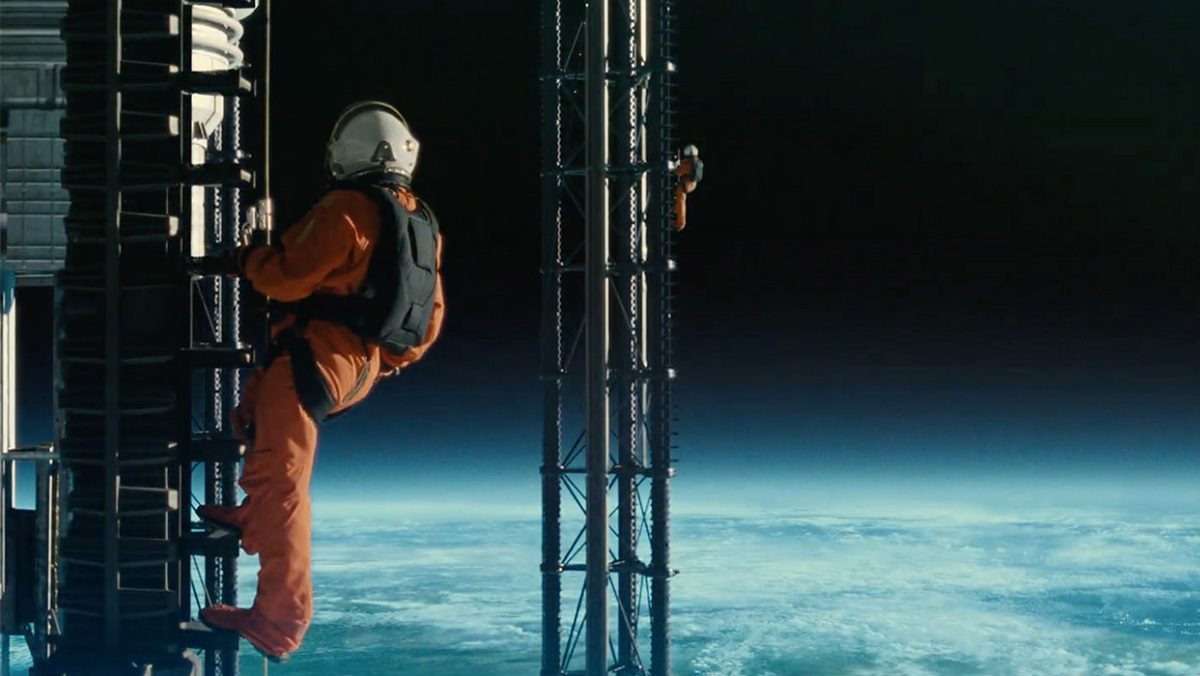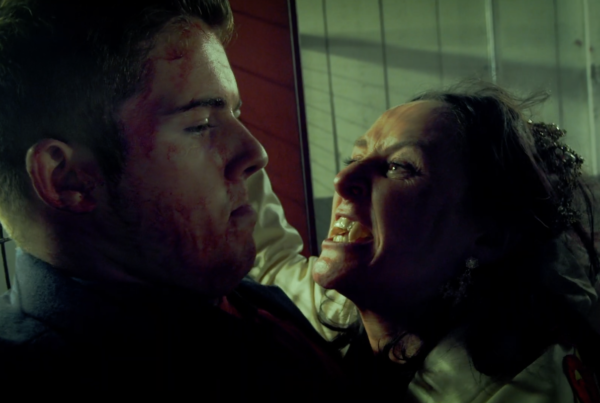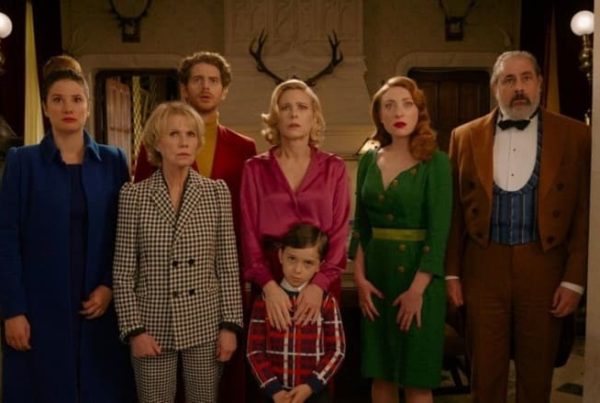Directed by James Gray
Written by James Gray and Ethan Gross
Starring Brad Pitt, Tommy Lee Jones, Ruth Negga, Donald Sutherland, Liv Tyler
 James Gray’s Ad Astra is an achievement in cinema. There’s not a lot to the story, but that isn’t what this film is about. We could cover what happens, but that’s nowhere near as important as what’s going on. Yes, there is a difference. And yes, in this film, that difference is vast.
James Gray’s Ad Astra is an achievement in cinema. There’s not a lot to the story, but that isn’t what this film is about. We could cover what happens, but that’s nowhere near as important as what’s going on. Yes, there is a difference. And yes, in this film, that difference is vast.
It’s about western masculinity. It’s about the capitalist drive for more, always more. It’s about relationships. It’s about expectations. It’s about religion. It’s about philosophy. It’s about tradition. It’s about letting go of all that and living your life.
But okay, fine, the story. Brad Pitt plays Roy McBride, a Major in the US Space Command. Roy would likely describe himself as stoic, misunderstanding the term. He’s entirely self-reliant, immune to distractions and focused only on the mission at hand, whatever that may be. The perfect soldier for a solo mission. Roy’s father, Dr Clifford McBride (Tommy Lee Jones) led an expedition out to Neptune a few decades back, searching for signs of alien life. The expedition disappeared, but now SpaceCom thinks maybe he’s still alive and sends Roy off to track down his absent father. It’s a bit of an Apocalypse Now meets 2001: A Space Odyssey deal, a galactic search for the dark heart of the universe.
In the vein of Apocalypse Now, Gray has given us a slow movie. There are some great action sequences (the moon buggy chase, featured heavily in promos, is fantastic) but they’re not the main dish here, they’re the sides you greedily devour because the main takes some chewing. If you go in wanting space battles and explosions, you’re going to have a bad time. Instead, we have a film about the unflappable, all-American epitome of manhood (surely this was written with Pitt in mind) dealing with his connection, or lack thereof, to a father who abandoned his family in a quest to prove himself right, and gaining an understanding of his place (and, by extension, our place) in the universe. It’s heavy stuff.
And that’s why this is going to bomb at the box office.
 It’s a pity because Ad Astra is a film which absolutely deserves an audience. This is the kind of cerebral, quiet, thoughtful science fiction which is all too absent in modern cinema. Like its lead, this film is calm and quiet on the surface, but it’s doing so in order to avoid being overwhelmed by what’s going on underneath. Occasionally some of that comes bubbling out, but composure is quickly regained. After all, there’s a mission to complete here, albeit one which isn’t quite what it initially set out to be.
It’s a pity because Ad Astra is a film which absolutely deserves an audience. This is the kind of cerebral, quiet, thoughtful science fiction which is all too absent in modern cinema. Like its lead, this film is calm and quiet on the surface, but it’s doing so in order to avoid being overwhelmed by what’s going on underneath. Occasionally some of that comes bubbling out, but composure is quickly regained. After all, there’s a mission to complete here, albeit one which isn’t quite what it initially set out to be.
Things not really going the way you expected is another theme here, and one which didn’t necessarily sit well with the audience in the session I saw. Again, this is a pity because it’s a journey worth taking. It’s really an internal journey, one which leaves Roy a better, more rounded person; someone who understands that true stoicism is not walling oneself off and denying emotion, but in living within society by being part of it and understanding one’s emotions.
In exploring this, Ad Astra looks at modern masculinity and how to remove the toxicity from the popularly-accepted definitions of manhood. This is where the casting of Pitt works so well, reflecting and rejecting the failed philosophy of his character in Fight Club. It’s a story a lot of men need to understand, but also one they’re likely to reject.
There’s a strong thread of religion running through this film, from the overt name-checking and prayers offered by various characters, to the dedicated search for something beyond humanity, to the continued love for an indifferent father, and it’s interesting to note that Roy never invokes God, despite being part of a clearly religious society.
 There has already been some speculation that this could be Pitt’s Oscar film, and it’s easy to see why. It’s a beautiful performance, if you know what you’re looking for. He is playing a man in control, a man who has never had his pulse go above 80bpm, a man of singular focus, a man seemingly without passion. Such a role could easily come across as flat and wooden, but Pitt instead brings an overwhelming sense of restraint, keeping regrets and anger at bay, the damage that has caused and the catharsis of releasing that white-knuckle grip, to become a more complete person. Roy is not a benevolent hero, self-interest and self-preservation are his main motivators through the majority of the film, but that’s where we get growth and, through that, hope.
There has already been some speculation that this could be Pitt’s Oscar film, and it’s easy to see why. It’s a beautiful performance, if you know what you’re looking for. He is playing a man in control, a man who has never had his pulse go above 80bpm, a man of singular focus, a man seemingly without passion. Such a role could easily come across as flat and wooden, but Pitt instead brings an overwhelming sense of restraint, keeping regrets and anger at bay, the damage that has caused and the catharsis of releasing that white-knuckle grip, to become a more complete person. Roy is not a benevolent hero, self-interest and self-preservation are his main motivators through the majority of the film, but that’s where we get growth and, through that, hope.
Tommy Lee Jones’ turn as Clifford McBride is a fantastic portrayal of an old man alone with an obsession, for which he has sacrificed everything, far too long. A scientist whose convictions have driven him to deny science, lest it all be for naught. His shift from lone crusader to an old man, resigned to his fate is beautiful and heartbreaking. His casting, opposite Pitt, is inspired, his grizzled, hang-dog face standing in contrast to Pitt’s surprisingly-youthful looks. Here, Jones perfectly encapsulates the spirit of an older generation, wrapped up in uncovering the mysteries of the universe, while their offspring eschew the metaphysical and just want parental connection. Not a universal theme, perhaps, but surely one which will resonate with a lot of Gen X-ers.
Donald Sutherland is a joy to watch in his relatively short time on screen (anyone who can’t wring some joy from seeing his face on screen is probably dead inside) and the rest of the supporting cast put in solid work, but this is very much Brad Pitt’s show. The fact that Liv Tyler’s Eve (another religious reference?) is almost reduced to window-dressing may draw some ire, but this is not her story. On the contrary, I would go so far as to say that her absence from the narrative is vital to the exploration of Roy’s internal world.
 Cinematography by Hoyte van Hoytema is utterly gorgeous. From the epic sweep of a starfield to an adrenaline-charged skydive, to the quietly frenetic moon battle, every frame is meticulously crafted to draw us along on Roy’s journey. There’s a moment where one would normally expect a focus pull and the subversion of that expectation feels like a director and cinematographer working perfectly together. This makes Ad Astra well worth seeing on the big screen. A large television might just do the job, but these are visuals which reward the cinema viewer by enveloping us in a world which is both familiar and alien.
Cinematography by Hoyte van Hoytema is utterly gorgeous. From the epic sweep of a starfield to an adrenaline-charged skydive, to the quietly frenetic moon battle, every frame is meticulously crafted to draw us along on Roy’s journey. There’s a moment where one would normally expect a focus pull and the subversion of that expectation feels like a director and cinematographer working perfectly together. This makes Ad Astra well worth seeing on the big screen. A large television might just do the job, but these are visuals which reward the cinema viewer by enveloping us in a world which is both familiar and alien.
Max Richter’s score perfectly complements the film, never drowning out action or dialogue, but working in concert to hit the right emotional beats. It’s beautiful, calm and urgent all at once.
For all that Ad Astra challenges audience expectations, there are a couple of concessions to the audience which I feel could have been avoided. The first is the voice over. While nowhere near as flat and bored as Harrison Ford’s famous Blade Runner VO, it still feels unnecessary. Most of what we are told can be easily inferred through the action, if you’re paying attention. The second is the final moments of the film. I’m a sucker for an ambiguous ending and, while it’s still a lovely callback to the opening, it’s a moment I could have done without, feeling quite satisfied with a possible end point about 30 seconds earlier. This addition was apparently something for which Pitt, in his role as a producer, pushed for. Certainly this will be more of a crowd pleasing finale and, given this is one of the last films we will see from a non-Disney 20th Century Fox, pleasing crowds is not unimportant. These are but minor quibbles, it will be interesting to see if a director’s cut comes out down the track.
 Ad Astra is a masterfully constructed film. At 122 minutes, it never feels bloated and, while certainly not a non-stop thrill ride, it never drags. Everything works together, like an audiovisual symphony, and James Gray’s baton never wavers as he conducts this orchestra with the assurance and confidence of someone who can hear every note well before it is played. This gives us a rare science fiction film which really understands what lies at the heart of sci-fi. It’s not about the robots, the aliens, the laser-swords or the technology. All those things are great and I love them, but they’re all just props. The heart of great science fiction is a reflection on humanity; what we are, where we are going, and our place in the universe. When we look to the future, we are really looking at the present and what opportunities are open to us. When we look to the stars, we speculate on how we might grow. Ad Astra addresses these questions and, while you might not agree with the answers, it does so in an undeniably beautiful way.
Ad Astra is a masterfully constructed film. At 122 minutes, it never feels bloated and, while certainly not a non-stop thrill ride, it never drags. Everything works together, like an audiovisual symphony, and James Gray’s baton never wavers as he conducts this orchestra with the assurance and confidence of someone who can hear every note well before it is played. This gives us a rare science fiction film which really understands what lies at the heart of sci-fi. It’s not about the robots, the aliens, the laser-swords or the technology. All those things are great and I love them, but they’re all just props. The heart of great science fiction is a reflection on humanity; what we are, where we are going, and our place in the universe. When we look to the future, we are really looking at the present and what opportunities are open to us. When we look to the stars, we speculate on how we might grow. Ad Astra addresses these questions and, while you might not agree with the answers, it does so in an undeniably beautiful way.
TIM BRADSHAW




